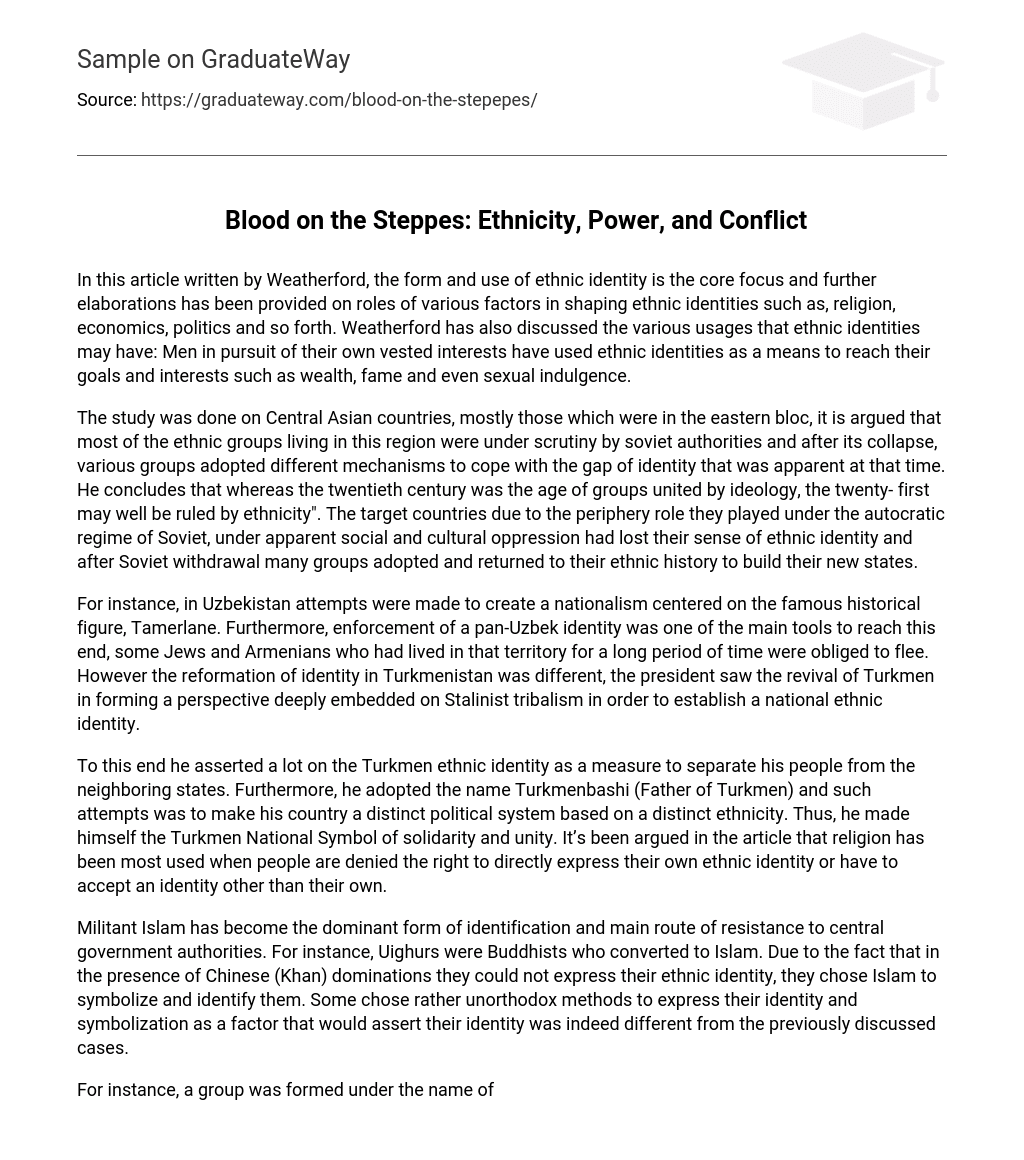Weatherford’s article explores the form and utilization of ethnic identity, emphasizing its central role. The author delves into the impact of different factors, such as religion, economics, and politics, on the development of ethnic identities. Furthermore, Weatherford highlights the diverse purposes that ethnic identities can serve, noting that individuals have employed them to achieve personal gains like wealth, fame, and even sexual gratification.
The study conducted on Central Asian countries, particularly those that were part of the eastern bloc, reveals that Soviet authorities closely monitored the majority of ethnic groups in this region. After the collapse of the Soviet Union, various strategies were adopted by different groups to cope with the loss of identity during that time. The author’s conclusion is that while unity based on a shared ideology was prominent in the twentieth century, ethnicity is likely to take precedence in the twenty-first century.
During the authoritarian rule of the Soviet regime, these marginalized countries experienced a loss of ethnic identity due to social and cultural oppression. However, with the withdrawal of the Soviet Union, many groups embraced and reclaimed their ethnic histories as a means to establish new states.
Attempts were made in Uzbekistan to create a nationalism centered on the historical figure Tamerlane. This involved enforcing a pan-Uzbek identity, which led to some Jews and Armenians who had lived in the territory for a long time being forced to flee. In Turkmenistan, however, the president took a different approach to identity reformation. He sought to revive Turkmen culture by embracing a perspective rooted in Stalinist tribalism, with the goal of establishing a national ethnic identity.
Turkmenbashi stressed the importance of Turkmen ethnic identity to distinguish his people from neighboring states. He chose the name Turkmenbashi, meaning Father of Turkmen, to create a political system centered on a unique ethnicity. This approach enabled him to symbolize unity and solidarity within the Turkmen population. The article proposes that religion is often utilized by individuals who cannot openly express their own ethnic identity or are forced to embrace a different one.
The dominant means by which individuals assert their identities and challenge central government authorities is through the rise of militant Islam. As an example, the Uighurs, who once practiced Buddhism, adopted Islam as a means to express their ethnic identity due to restrictions imposed by Chinese rule. Certain individuals went beyond conventional methods to emphasize the distinctiveness of their identity in comparison to similar situations.
The formation of a group known as “Reebok Mafia” exemplifies how individuals with different places of residence and ethnic backgrounds can unite. To differentiate themselves, members decided to wear clothing items from the Reebok Company. In some cases, ethnic identity has been employed in the pursuit of sexual fulfillment. Kirgizstan allows for elopement between a man and woman or for men to abduct women for marriage – this custom is referred to as Bride Capture.
During an interview with a family, it was evident that men are using their ethnic background to justify acts of sexual assault or rape. The influence of ethnicity in shaping societies today cannot be underestimated. Although some may consider it outdated or traditional, ethnicity continues to be utilized as a means of establishing national identity in a world where embracing diversity and different cultures is becoming increasingly crucial in social and official engagements.
In the 21st century, developed and post-modern societies prioritize social co-existence, harmony, civic nationalism instead of tribalism or ethnic-based identities. From my point of view, ethnic identities are outdated, particularly when a state is established on such criteria. This is because there are diverse micro-societies divided by religion, language, and ethnicity. Consequently, Afghans have endured numerous brutal atrocities from rival groups with strong ethnocentric values and perspectives.
After the U. S invasion of Afghanistan, educated politicians frequently criticize the division of power and authorities in the government, which is based on four major ethnicities. This concept has undermined the government’s performance, effectiveness, and efficiency. Another potential solution to address the growing tensions surrounding this issue is to adopt meritocracy as the basis for selecting and eliminating public servants in governmental agencies.





